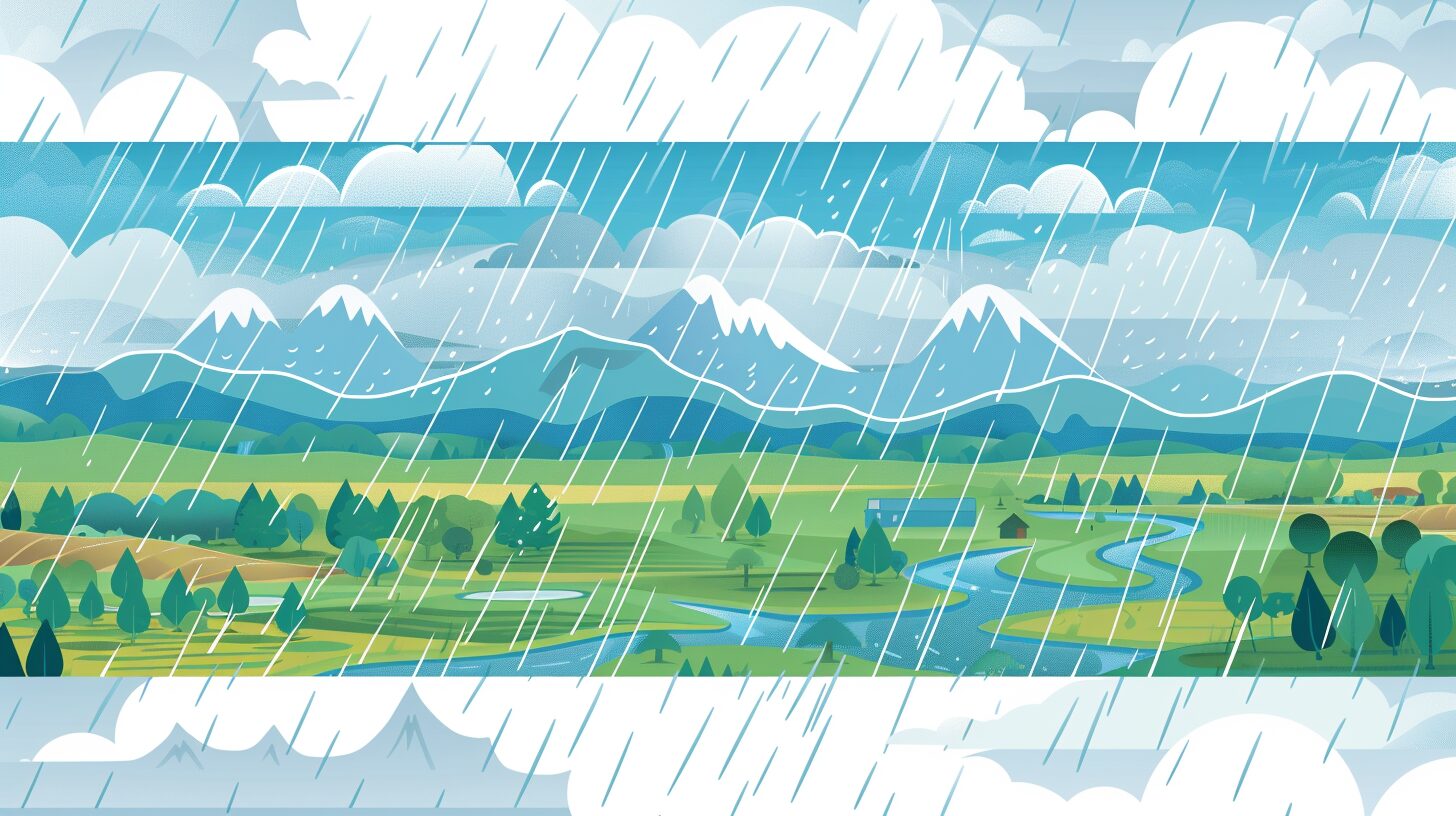線状降水帯を英語で説明・紹介するための基本情報と、英会話に役立つ表現をシンプルでわかりやすい英語で紹介します。
英会話ダイアローグ・関連情報・10の質問を通して、線状降水帯に関する英語表現を学びます。
英語
英会話ダイアローグを読む前に知っておくと良い前提知識と情報は以下の通りです。
- 線状降水帯とは
- 狭い範囲に集中して強い雨を降らせる現象、これが長時間続くことで、洪水や土砂災害の原因となる
- 線状降水帯の特徴
- 持続性: 数時間から十数時間にわたって同じ場所に強い雨が降り続ける
- 線状の形状: 雨域が細長く、線状に連なる
- 大量の降水量: 短時間で大量の雨を降らせる
- 線状降水帯の形成メカニズム
- 温度差: 暖かい空気と冷たい空気がぶつかると、上昇気流が強化される
- 湿った空気: 海からの湿った空気が供給されることで、対流雲が発生しやすくなる
- 風の収束: 地表付近で風が収束することで、上昇気流が強化される
- 線状降水帯の影響
- 洪水: 河川が増水し、氾濫する
- 土砂災害: 豪雨によって地面が不安定になり、土砂崩れや地滑りが発生しやすくなる
- 都市部の浸水: 排水能力を超える降水量により、道路や建物が浸水する
- 予報の重要性
- 都道府県単位の予報: 線状降水帯の予報は都道府県単位で行われ、具体的で正確な情報が提供され、住民の安全確保に役立つ
- 安全対策
- 情報の確認: 定期的に最新の気象情報をチェックする
- 避難準備: 避難場所と避難経路を確認し、非常用持ち出し袋を用意する
- コミュニケーション: 家族や近隣の人と避難計画を共有し、緊急時に連絡を取り合う
線状降水帯の予報が、都道府県単位で発表されることについて話しています。
2人が、線状降水帯の形成メカニズム、影響、安全対策について話題にし、正確な予報がいかに安全確保に役立つかを話しています。
会話 / dialogue

Hey Key, did you hear about the new linear rainband forecasts?

Yeah, I heard they’re now going to be at the prefectural level starting from May 28. It’s supposed to make forecasts more accurate, right?

Exactly. Linear rainbands cause heavy rain in a narrow area for hours. By focusing on specific prefectures, the Japan Meteorological Agency can give more precise warnings.

That sounds really useful. So, how do these linear rainbands form?

They form when warm and cold air masses meet, creating strong upward air currents. If there’s also moist air from the ocean and converging winds, it can result in these long, narrow lines of heavy rain.

And they last for several hours?

Yes, which can cause severe flooding and landslides. That’s why accurate forecasts are so important. People need time to prepare and evacuate if necessary.

What kind of impacts do they have on cities?

Cities can experience urban flooding because the drainage systems get overwhelmed. Plus, rivers can overflow and cause widespread flooding.

I guess landslides are a big risk too, especially in mountainous areas.

Exactly. The ground gets saturated with water, becoming unstable and leading to landslides. It’s crucial to be aware of the risks.

So, what should we do if a linear rainband is forecasted?

First, stay informed by checking the latest weather updates. If there’s a warning, prepare to evacuate early. Know your safe places and evacuation routes, and have an emergency bag ready.

Good advice. And we should also communicate with our family and neighbors, right?

Definitely. Make sure everyone knows the plan and stays in touch. It’s important to act quickly to stay safe.

It sounds like the new forecasting system will really help people prepare better.

Absolutely. More specific information means better preparedness and safety for everyone.

Thanks for explaining all this, Mack. It’s good to know how to stay safe during these events.

No problem, Key. Staying informed and prepared is the best way to handle severe weather.
関連情報 / related information
「線状降水帯」について、理解を深めるための「英語での関連情報」です。
線状降水帯

What is a Linear Rainband?
A linear rainband is a weather phenomenon where heavy rain falls in a long, narrow line. This rain can last for several hours, leading to severe weather conditions like floods and landslides. Linear rainbands form when warm and cold air masses meet, creating strong upward air currents. If there is also moist air from the ocean and converging winds, these rainbands can develop.
Characteristics of Linear Rainbands
Linear rainbands are known for their duration and intensity. They can persist for hours, causing continuous heavy rain in a specific area. The rainbands appear as long, narrow lines on weather maps. Because they bring a lot of rain in a short period, they often lead to significant flooding and landslides.
Impacts of Linear Rainbands
The impacts of linear rainbands can be severe. Flooding occurs when rivers overflow due to the heavy rain. Urban areas may experience flooding as drainage systems become overwhelmed. Landslides are another major risk, especially in mountainous regions, where the saturated ground can become unstable and slide.
Importance of Forecasting
Starting from May 28, 2024, the Japan Meteorological Agency (JMA) will issue linear rainband forecasts at the prefectural level. This change aims to provide more accurate and localized weather information. Accurate forecasts help people prepare and take action to stay safe during these severe weather events.
Safety Measures
To stay safe during linear rainbands, it is important to stay informed by checking weather updates regularly. If a warning is issued, be ready to evacuate early. Know your evacuation routes and have an emergency bag ready. Communicate with family and neighbors to ensure everyone knows the plan and stays in touch.
10の質問 / 10 questions
「線状降水帯」について、理解を深めるための「英語での10の質問」です。
1: What is a linear rainband?
A linear rainband is a long, narrow area of heavy rain that can last for several hours. It forms when warm and cold air masses meet and create strong upward air currents, often leading to floods and landslides.
2: How does a linear rainband form?
A linear rainband forms when warm, moist air meets cooler air, causing the warm air to rise rapidly. This creates strong upward air currents, which lead to the formation of clouds and intense rainfall.
3: Why are linear rainbands dangerous?
Linear rainbands are dangerous because they can bring heavy rain to one area for a long time, leading to flooding, landslides, and damage to infrastructure. Urban areas can especially suffer from drainage system overloads.
4: How long can a linear rainband last?
A linear rainband can last for several hours, sometimes even longer. This prolonged rainfall increases the risk of flooding and other weather-related disasters.
5: Where are linear rainbands most likely to occur?
Linear rainbands often occur in areas where warm, moist air from the ocean meets cooler air. This is common in coastal regions, especially in Japan, where the Pacific Ocean provides moisture.
6: How can people stay safe during a linear rainband?
People should stay informed by checking weather updates regularly, prepare to evacuate early, and avoid low-lying areas where flooding is likely. Having an emergency bag and a clear evacuation plan is also important.
7: What is the role of the Japan Meteorological Agency (JMA) in forecasting linear rainbands?
The JMA provides weather forecasts and warnings about linear rainbands. Starting in May 2024, they will issue more localized forecasts at the prefectural level to help people prepare more effectively.
8: How do linear rainbands affect urban areas?
In urban areas, heavy rain from linear rainbands can overwhelm drainage systems, leading to street flooding, property damage, and disruption to transportation. Flooded roads and blocked drains are common problems.
9: What are the signs that a linear rainband might form?
Signs of a forming linear rainband include weather reports predicting prolonged heavy rain, sudden temperature changes, and wind patterns that indicate warm and cold air are meeting.
10: How does a linear rainband contribute to landslides?
Continuous heavy rain from a linear rainband can saturate the ground, making it unstable. In mountainous regions, this increases the risk of landslides as the soil and rocks lose their stability.
和訳付
会話 / dialogue

Hey Key, did you hear about the new linear rainband forecasts?
ねえ、キー、新しい線状降水帯の予報について聞いた?

Yeah, I heard they’re now going to be at the prefectural level starting from May 28. It’s supposed to make forecasts more accurate, right?
うん、5月28日から都道府県単位で行われるようになるって聞いたよ。予報がもっと正確になるんだよね?

Exactly. Linear rainbands cause heavy rain in a narrow area for hours. By focusing on specific prefectures, the Japan Meteorological Agency can give more precise warnings.
その通り。線状降水帯は狭い範囲に何時間も大雨を降らせるから、特定の都道府県に焦点を当てることで、気象庁はより正確な警報を出せるんだ。

That sounds really useful. So, how do these linear rainbands form?
それはすごく役立ちそうだね。ところで、この線状降水帯はどうやって形成されるの?

They form when warm and cold air masses meet, creating strong upward air currents. If there’s also moist air from the ocean and converging winds, it can result in these long, narrow lines of heavy rain.
暖かい空気と冷たい空気がぶつかると、強い上昇気流ができるんだ。そこに海からの湿った空気と収束する風が加わると、こういった長くて狭い大雨の帯ができるんだよ。

And they last for several hours?
それで、何時間も続くの?

Yes, which can cause severe flooding and landslides. That’s why accurate forecasts are so important. People need time to prepare and evacuate if necessary.
そう、だから大洪水や土砂崩れを引き起こすことがあるんだ。それで正確な予報がとても重要なんだよ。人々は準備して必要なら避難する時間が必要だからね。

What kind of impacts do they have on cities?
都市にはどんな影響があるの?

Cities can experience urban flooding because the drainage systems get overwhelmed. Plus, rivers can overflow and cause widespread flooding.
都市では排水システムが追いつかなくなって都市型洪水が発生することがあるんだ。それに、河川が氾濫して広範囲に洪水を引き起こすこともあるよ。

I guess landslides are a big risk too, especially in mountainous areas.
土砂崩れも大きなリスクだよね、特に山岳地帯では。

Exactly. The ground gets saturated with water, becoming unstable and leading to landslides. It’s crucial to be aware of the risks.
その通り。地面が水を含みすぎて不安定になり、土砂崩れが起きるんだ。リスクを知っておくことが重要だよ。

So, what should we do if a linear rainband is forecasted?
じゃあ、線状降水帯の予報が出たらどうすればいいの?

First, stay informed by checking the latest weather updates. If there’s a warning, prepare to evacuate early. Know your safe places and evacuation routes, and have an emergency bag ready.
まず、最新の天気情報をチェックして情報を把握するんだ。警報が出たら早めに避難の準備をする。安全な場所や避難経路を確認して、非常用持ち出し袋を用意しておくんだよ。

Good advice. And we should also communicate with our family and neighbors, right?
いいアドバイスだね。家族や近所の人とも連絡を取るべきだよね?

Definitely. Make sure everyone knows the plan and stays in touch. It’s important to act quickly to stay safe.
その通り。みんなが計画を把握して連絡を取り合うことが大切だよ。安全を確保するためには迅速に行動することが重要なんだ。

It sounds like the new forecasting system will really help people prepare better.
新しい予報システムは人々がより良く準備するのに本当に役立ちそうだね。

Absolutely. More specific information means better preparedness and safety for everyone.
その通り。より具体的な情報があることで、みんながより良く準備できて安全性が高まるんだ。

Thanks for explaining all this, Mack. It’s good to know how to stay safe during these events.
説明してくれてありがとう、マック。こうした状況でどう安全を確保するかを知るのは良いことだね。

No problem, Key. Staying informed and prepared is the best way to handle severe weather.
どういたしまして、キー。情報を把握して準備を整えることが、厳しい天候に対処する最善の方法だよ。
関連情報 / related information
線状降水帯

What is a Linear Rainband?
A linear rainband is a weather phenomenon where heavy rain falls in a long, narrow line. This rain can last for several hours, leading to severe weather conditions like floods and landslides. Linear rainbands form when warm and cold air masses meet, creating strong upward air currents. If there is also moist air from the ocean and converging winds, these rainbands can develop.
線状降水帯は、狭く長い線状に強い雨が降る気象現象です。この雨は数時間続くことがあり、洪水や土砂災害のような厳しい天候を引き起こします。線状降水帯は、暖かい空気と冷たい空気が出会うときに形成され、強い上昇気流を生み出します。さらに海からの湿った空気と収束する風があると、これらの雨帯が発生することがあります。
Characteristics of Linear Rainbands
Linear rainbands are known for their duration and intensity. They can persist for hours, causing continuous heavy rain in a specific area. The rainbands appear as long, narrow lines on weather maps. Because they bring a lot of rain in a short period, they often lead to significant flooding and landslides.
線状降水帯は、その持続時間と強度で知られています。数時間にわたって続き、特定の地域に連続して大雨をもたらします。気象図では、細長い線として現れます。短時間で大量の雨をもたらすため、大規模な洪水や土砂災害を引き起こすことがよくあります。
Impacts of Linear Rainbands
The impacts of linear rainbands can be severe. Flooding occurs when rivers overflow due to the heavy rain. Urban areas may experience flooding as drainage systems become overwhelmed. Landslides are another major risk, especially in mountainous regions, where the saturated ground can become unstable and slide.
線状降水帯の影響は深刻です。大雨によって河川が氾濫すると洪水が発生します。都市部では排水システムが追いつかず、浸水することがあります。特に山岳地域では、地面が飽和して不安定になり、土砂崩れのリスクが高まります。
Importance of Forecasting
Starting from May 28, 2024, the Japan Meteorological Agency (JMA) will issue linear rainband forecasts at the prefectural level. This change aims to provide more accurate and localized weather information. Accurate forecasts help people prepare and take action to stay safe during these severe weather events.
2024年5月28日から、日本気象庁は都道府県単位で線状降水帯の予報を行います。この変更は、より正確で局地的な気象情報を提供することを目的としています。正確な予報は、人々が準備を整え、安全を確保するための行動を取るのに役立ちます。
Safety Measures
To stay safe during linear rainbands, it is important to stay informed by checking weather updates regularly. If a warning is issued, be ready to evacuate early. Know your evacuation routes and have an emergency bag ready. Communicate with family and neighbors to ensure everyone knows the plan and stays in touch.
線状降水帯の際には、安全を確保するために、定期的に天気の更新情報を確認することが重要です。警報が発令された場合は、早めに避難の準備をしましょう。避難経路を確認し、非常用持ち出し袋を用意しておきます。家族や近隣の人と連絡を取り合い、全員が計画を把握していることを確認します。
10の質問 / 10 questions
1: What is a linear rainband?
線状降水帯とは何ですか?
A linear rainband is a long, narrow area of heavy rain that can last for several hours. It forms when warm and cold air masses meet and create strong upward air currents, often leading to floods and landslides.
線状降水帯は、長時間続く強い雨の狭く長い領域です。暖かい空気と冷たい空気がぶつかり、強い上昇気流を生むことで形成され、洪水や土砂災害を引き起こすことがよくあります。
2: How does a linear rainband form?
線状降水帯はどのように形成されますか?
A linear rainband forms when warm, moist air meets cooler air, causing the warm air to rise rapidly. This creates strong upward air currents, which lead to the formation of clouds and intense rainfall.
線状降水帯は、暖かく湿った空気が冷たい空気と出会い、暖かい空気が急速に上昇することで形成されます。これにより、強い上昇気流が生まれ、雲や激しい降雨が発生します。
3: Why are linear rainbands dangerous?
線状降水帯はなぜ危険なのですか?
Linear rainbands are dangerous because they can bring heavy rain to one area for a long time, leading to flooding, landslides, and damage to infrastructure. Urban areas can especially suffer from drainage system overloads.
線状降水帯は、同じ地域に長時間大雨を降らせるため、洪水や土砂崩れ、インフラへの被害を引き起こします。特に都市部では排水システムが機能しなくなることがあります。
4: How long can a linear rainband last?
線状降水帯はどれくらいの時間続くのですか?
A linear rainband can last for several hours, sometimes even longer. This prolonged rainfall increases the risk of flooding and other weather-related disasters.
線状降水帯は数時間続くことがあり、時にはさらに長く続くこともあります。この長時間の降雨は、洪水やその他の気象災害のリスクを高めます。
5: Where are linear rainbands most likely to occur?
線状降水帯はどこで発生しやすいですか?
Linear rainbands often occur in areas where warm, moist air from the ocean meets cooler air. This is common in coastal regions, especially in Japan, where the Pacific Ocean provides moisture.
線状降水帯は、海からの暖かく湿った空気が冷たい空気とぶつかる場所でよく発生します。特に日本の沿岸地域で、太平洋からの湿気が関与しています。
6: How can people stay safe during a linear rainband?
線状降水帯の際、どのように安全を確保できますか?
People should stay informed by checking weather updates regularly, prepare to evacuate early, and avoid low-lying areas where flooding is likely. Having an emergency bag and a clear evacuation plan is also important.
人々は定期的に天気の更新を確認し、早めに避難準備をし、洪水の可能性がある低地を避けるべきです。非常用持ち出し袋を用意し、明確な避難計画を立てることも重要です。
7: What is the role of the Japan Meteorological Agency (JMA) in forecasting linear rainbands?
線状降水帯の予報における日本気象庁(JMA)の役割は何ですか?
The JMA provides weather forecasts and warnings about linear rainbands. Starting in May 2024, they will issue more localized forecasts at the prefectural level to help people prepare more effectively.
日本気象庁は線状降水帯の天気予報と警報を提供しています。2024年5月から、より地域ごとの予報が都道府県単位で発表される予定で、効果的な備えができるよう支援します。
8: How do linear rainbands affect urban areas?
線状降水帯は都市部にどのような影響を与えますか?
In urban areas, heavy rain from linear rainbands can overwhelm drainage systems, leading to street flooding, property damage, and disruption to transportation. Flooded roads and blocked drains are common problems.
都市部では、線状降水帯による大雨が排水システムを圧迫し、道路の浸水や物的被害、交通機関の混乱を引き起こすことがあります。浸水した道路や詰まった排水溝は一般的な問題です。
9: What are the signs that a linear rainband might form?
線状降水帯が形成される兆候は何ですか?
Signs of a forming linear rainband include weather reports predicting prolonged heavy rain, sudden temperature changes, and wind patterns that indicate warm and cold air are meeting.
線状降水帯が形成される兆候としては、長時間の大雨の予報、突然の気温変化、暖かい空気と冷たい空気がぶつかっていることを示す風のパターンなどがあります。
10: How does a linear rainband contribute to landslides?
線状降水帯は土砂崩れにどのように寄与しますか?
Continuous heavy rain from a linear rainband can saturate the ground, making it unstable. In mountainous regions, this increases the risk of landslides as the soil and rocks lose their stability.
線状降水帯による連続した大雨は地面を飽和させ、不安定にします。山岳地域では、土壌や岩石が安定性を失い、土砂崩れのリスクが高まります。
words & phrases
英会話ダイアローグと関連情報に出てきた単語・フレーズです(例文は各3つ)。

masses: 名詞 /ˈmæsɪz/
意味: 大量のものや人。Large quantities or groups of people or things.
(線状降水帯の形成で、暖かい空気と冷たい空気の「塊」がぶつかることを指す)
例文
There were masses of people at the concert.
「コンサートには大量の人々がいました。」
The masses of data collected will help in the research.
「収集された大量のデータが研究に役立ちます。」
The warm and cold air masses collided to form the storm.
「暖かい空気と冷たい空気の塊がぶつかって嵐を形成しました。」
drainage: 名詞 /ˈdreɪ.nɪdʒ/
意味: 排水、排水システム。The system or process by which water or other liquids are drained from an area.
(都市部での「排水システム」が線状降水帯による豪雨で追いつかないことを指す)
例文
Good drainage is essential to prevent flooding.
「洪水を防ぐためには良い排水が不可欠です。」
The drainage system in the city was overwhelmed by the heavy rain.
「都市の排水システムは大雨で追いつかなかった。」
The field needs better drainage to avoid waterlogging.
「水浸しを避けるために畑にはより良い排水が必要です。」
overflow: 動詞 /ˌoʊ.vərˈfloʊ/
意味: 溢れる、溢れ出す。To flow over the edge or brim; to be so full that the contents spill out.
(線状降水帯の影響で、河川が「氾濫」することを指す)
例文
The river overflowed its banks after the heavy rain.
「大雨の後、川は氾濫しました。」
The bathtub overflowed because I forgot to turn off the water.
「水を止めるのを忘れていたため、浴槽が溢れました。」
The crowd overflowed into the streets during the parade.
「パレードの間、群衆は通りに溢れました。」
saturated: 形容詞
意味: 飽和した、完全に浸透した。Holding as much water or moisture as can be absorbed; thoroughly soaked.
(土壌が「飽和」して不安定になり、土砂崩れのリスクが高まることを指す)
例文
The ground was saturated after the continuous rain.
「連続した雨の後、地面は飽和していました。」
The sponge is saturated with water.
「スポンジは水で飽和しています。」
The market is saturated with similar products.
「市場は似たような製品で飽和しています。」
duration: 名詞
意味: 持続期間。The length of time something lasts.
(線状降水帯が数時間にわたって続く「持続時間」を指す)
例文
The duration of the meeting was two hours.
「会議の持続時間は2時間でした。」
Please remain seated for the duration of the performance.
「公演の間は座ったままでいてください。」
The storm’s duration was longer than expected.
「嵐の持続時間は予想より長かった。」
